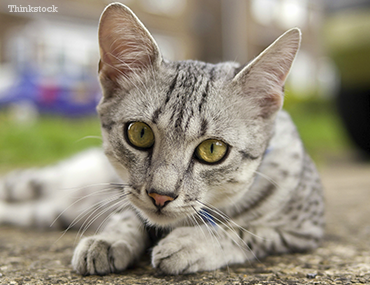Background:
You would think with a name like the Egyptian mau they would come from Egypt but as it happens the origin of this breed isn’t recorded. Mau’s are often said to be descended from African wild cats.
Attempts have been made to breed maus with Abyssinians, Siamese and tabbies.
In 1952 Russian Princess Natalie Troubetskaya was exiled to Italy and during her time there she met the cat of the Egyptian Ambassador. She persuaded the Ambassador to gather several cats from Egypt and bring them back to her in Italy, where she began to breed them. Troubetskaya described her maus as having a "troubled" look, with their round eyes and open expression.
Cat Facts:
- The Egyptian mau is the greyhound of cats: clocked at 30 miles per hour.

- Mau’s were often used for hunting because of their bird-like voices.
- Egyptian maus will have either a ‘scarab beetle’ or ‘M’ marking on their foreheads.
- Maus are on the smaller side, weighing in around 7-9 lbs.
What's the Egyptian Mau like?
Egyptian maus are typically slender while at the same time muscular. They have several differences from other cats: their legs, which are a little shorter in the front, explain why they’re also the fastest cat breed.
Maus are known for having a very loyal and friendly personality.
One health problem which might occur in this breed is leuodystrophy, which is a neurological condition that could appear in kittens. Keep in mind that this breed is more sensitive to medicines and anesthesia than most others.
Takeaway points:
- This breed loves getting affection and attention, but can be on the shy side sometimes, especially when meeting new friends.
- The texture of your cat’s fur will depict how much grooming is necessary. Cats with a silver or bronze coat have a denser fur texture.
- The Egyptian mau will run up your curtians, and even onto your shoulders, keep that mind when buying fancy drapes or sweaters.
- Because of how fast these guys are they’re able to sneak out quick, so keep them indoors to protect them from attacks and diseases. If you live near a road pay special attention.
If you have any questions or concerns, you should always visit or call your veterinarian – they are your best resource to ensure the health and well-being of your pets.
